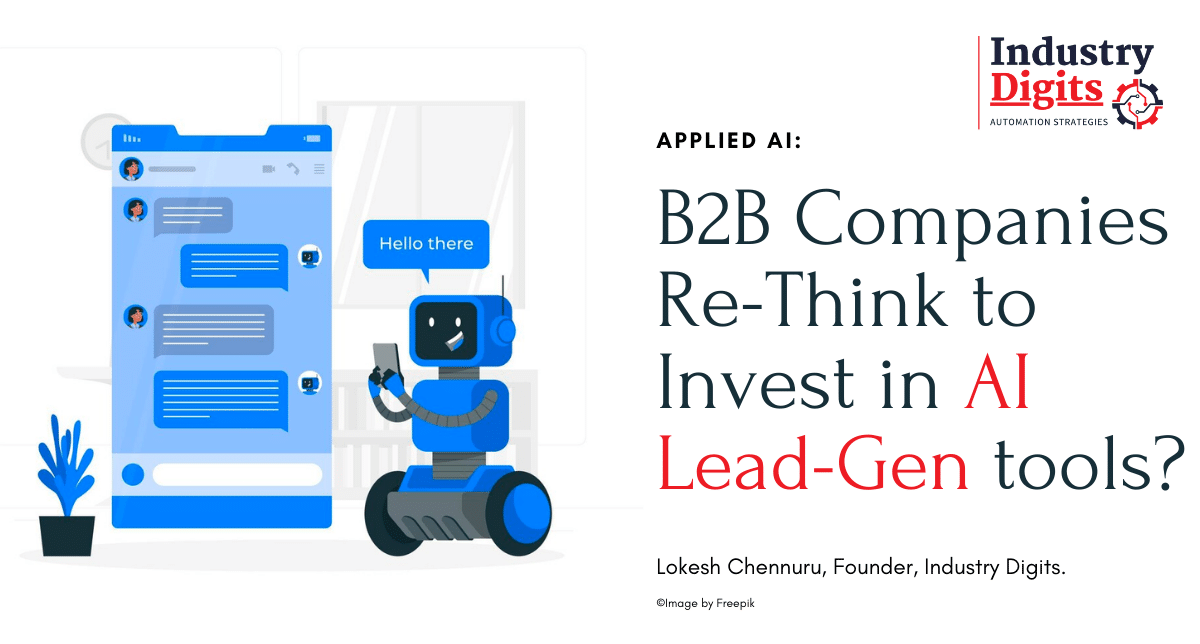Unlock Performance and Development With AI Automation for B2B Firms
AI automation is changing the landscape for B2B firms. It improves operations and lowers dependence on human treatment. This shift enables organizations to make quicker, data-driven choices. As organizations check out which refines to automate, they have to likewise take into consideration the right devices to carry out. Difficulties remain in adopting AI technology. The effects of these changes can form the future of numerous business in means yet to be totally recognized
Comprehending AI Automation in the B2B Context
As services significantly seek effectiveness, recognizing AI automation in the B2B context comes to be necessary. AI automation includes employing advanced innovations to streamline procedures, reduce human intervention, and improve decision-making processes. In the B2B landscape, this can show up in numerous forms, such as automating customer care interactions, managing supply chain logistics, or maximizing advertising campaigns. Companies can leverage AI to analyze substantial datasets swiftly, enabling them to recognize fads and understandings that inform tactical options. Furthermore, AI systems can integrate perfectly with existing modern technologies, offering a natural system for managing company features. This understanding lays the foundation for organizations to explore just how AI can change their procedures, improve efficiency, and ultimately foster sustainable development in an affordable market.
Secret Benefits of Carrying Out AI Automation

Determining Processes Appropriate for Automation

Choosing the Right AI Tools for Your Service
When B2B firms consider automating their procedures, selecting the best AI devices comes to be important for achieving wanted end results. Firms must start by evaluating their distinct needs and objectives, making certain placement with service goals (Business Process Automation). Examining the scalability, integration, and adaptability capabilities of possible tools is vital, as these variables figure out long-lasting performance. Organizations should additionally consider user-friendliness and the degree of assistance given by vendors, as these elements can affect successful implementation. Additionally, evaluating consumer evaluations and study can supply insights right into just how particular AI services do in real-world circumstances. By carefully choosing AI devices that fit their operational needs, B2B companies can enhance efficiency and drive growth while lessening prospective disturbances
Overcoming Difficulties in AI Fostering
B2B firms commonly experience considerable difficulties in adopting AI technologies, particularly issues associated with information top quality and resistance to change management. Poor data quality can impede the performance of AI systems, while staff member unwillingness to welcome new processes can delay application initiatives - AI Automation For B2B. Dealing with these challenges is necessary for effective AI combination and optimizing its possible advantages
Data Top Quality Issues
Guaranteeing high data quality is crucial for the successful fostering of AI technologies in business-to-business environments. Unreliable, incomplete, or outdated data can severely prevent AI campaigns, causing erroneous insights and poor decision-making. Business typically deal with difficulties such as information silos, incongruities throughout different sources, and an absence of standard data styles. To get rid of these issues, companies have to spend in data cleaning, assimilation, and governance processes. Carrying out durable information management techniques guarantees that the info fed right into AI systems is pertinent and trustworthy. Fostering a society of information quality awareness amongst employees can boost information accuracy over time. By attending to information high quality concerns, B2B business can launch the complete possibility of AI automation, driving efficiency and growth.
Adjustment Administration Resistance

Measuring the Effect of AI Automation
Gauging the influence of AI automation in B2B business requires a clear understanding of vital efficiency indicators (KPIs) that line up with company goals. Reliable information evaluation techniques are necessary for translating the results, while durable ROI assessment techniques assist establish the financial advantages of automation efforts. Together, these components give a considerable framework discover here for assessing AI's contributions to business success.
Key Efficiency Indicators
Secret performance indicators (KPIs) serve as essential tools for B2B business to evaluate the effectiveness of AI automation campaigns. By developing clear metrics, companies can measure renovations in functional efficiency, cost reduction, and earnings growth directly attributable to automation. Usual KPIs consist of cycle time decrease, error prices, customer satisfaction ratings, and staff member performance degrees. These signs offer understandings into how AI systems are optimizing procedures and improving total efficiency. Additionally, tracking KPIs makes it possible for firms to identify areas for additional improvement and to straighten AI automation efforts with strategic organization purposes. Inevitably, a well-defined framework of KPIs warranties that B2B companies can quantitatively review the impact of AI automation on their procedures and drive continuous development.
Data Analysis Techniques
Reliable information evaluation strategies play a crucial role in assessing the effect of AI automation within B2B business. By using analytical approaches, companies can identify trends and patterns in functional information, allowing them to evaluate the performance obtains accomplished through automation. Methods such as regression evaluation and time collection projecting give insights into just how AI-driven procedures affect performance and decision-making. Additionally, data visualization tools can successfully connect searchings for to stakeholders, promoting informed tactical choices. Device understanding formulas can better boost analysis by forecasting future end results based upon historical data, supplying actionable insights. Eventually, these methods enable B2B companies to gauge success and optimize their AI automation initiatives, making certain alignment with company objectives and boosting overall efficiency.
ROI Evaluation Methods
Evaluating the return on investment (ROI) of AI automation is necessary for B2B firms seeking to understand the monetary ramifications of their technological initiatives. Business can use numerous ROI analysis approaches to assess the performance of AI executions - Growth Systems For B2B. One effective approach includes determining expense savings by comparing functional expenditures before and after automation (B2B Growth Consulting). Additionally, gauging efficiency enhancements with crucial performance signs (KPIs) assists quantify the advantages of AI. Client fulfillment metrics can likewise provide understandings right into the effect of automation on service quality. To assure a complete assessment, business ought to think about both straight abstract benefits and monetary returns, such as boosted decision-making abilities and affordable benefit. This diverse analysis enables B2B firms to make informed decisions regarding future financial investments in AI technology
Future Patterns in AI Automation for B2B Business
What developments lie in advance for AI automation in B2B business? Arising patterns suggest a significant shift towards improved data analytics capacities, allowing organizations to make more informed decisions. Anticipating analytics will certainly come to be significantly necessary, allowing companies to anticipate market adjustments and consumer needs. Furthermore, the integration of AI with Net of Things (IoT) modern technology is anticipated to enhance operations by giving real-time understandings and automation of procedures. Companies will certainly likewise concentrate on improving consumer experiences with personalized advertising driven by AI algorithms. Moreover, innovations in natural language handling will certainly help with far better interaction between customers and businesses. As these patterns progress, B2B companies should adapt to take advantage of AI automation successfully, ensuring sustained development and affordable benefit.
Regularly Asked Concerns
What Industries Benefit the Most From AI Automation in B2B?
Manufacturing, finance, medical care, and logistics industries profit the most from AI automation in B2B. These markets utilize AI to optimize processes, boost decision-making, and enhance overall operational efficiency, driving substantial development and advancement.
How Does AI Automation Influence Staff Member Duties and Responsibilities?
AI automation improves staff member functions and responsibilities by enhancing repeated jobs, making it possible for employees to concentrate on tactical campaigns. This shift promotes ability advancement, improves productivity, and motivates partnership, inevitably driving business development and development.
What Are Common False Impressions About AI Automation in B2B?
Typical misunderstandings concerning AI automation in B2B consist of anxieties of job loss, beliefs that AI can fully change human judgment, and taking too lightly the importance of partnership between AI systems and staff members for suitable outcomes.
How Can Organizations Guarantee Information Privacy With AI Automation?
Organizations can ensure information personal privacy with AI automation by implementing durable security methods, sticking to regulative conformity, performing normal audits, and training staff members on information handling methods to alleviate dangers and secure delicate information.
What Are the Expenses Connected With Executing AI Automation?
The prices related to implementing AI automation consist of software program procurement, framework upgrades, training employees, recurring maintenance, and prospective downtime throughout combination. Additionally, companies may incur expenses associated with information safety and security and compliance procedures.
Gauging the effect of AI automation in B2B business needs a clear understanding of crucial efficiency indications (KPIs) that straighten with organization goals. Trick efficiency indications (KPIs) offer as necessary devices for B2B companies to assess the efficiency of AI automation initiatives. Effective data analysis techniques play a crucial duty in reviewing the impact of AI automation within B2B business. Evaluating the return on investment (ROI) of AI automation is essential for B2B business seeking to comprehend the financial implications of their technical efforts. What innovations exist ahead for AI automation in B2B business?